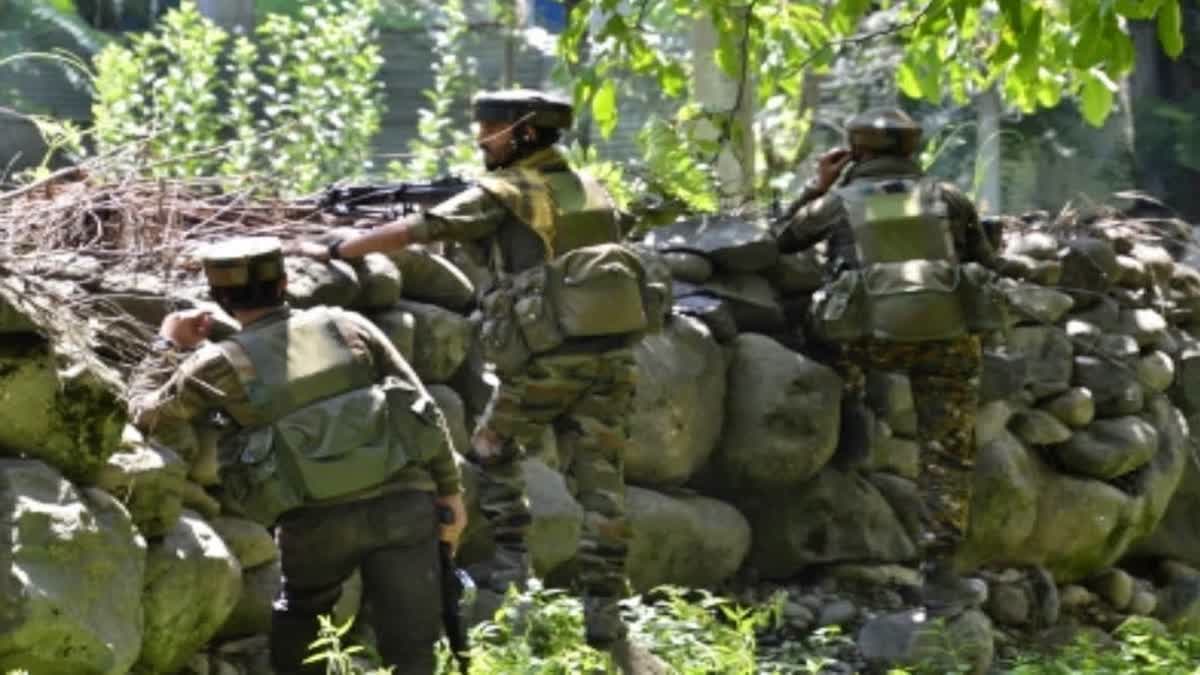Srinagar: Terrorists have upgraded infiltration tactics in Jammu and Kashmir and the recent lethal attacks on the Army indicate that the ground situation in the embattled region is sensitive and can slip towards instability, Vikram Jit Singh, a senior defence expert and war correspondent told ETV Bharat.
- " class="align-text-top noRightClick twitterSection" data="">
Four soldiers were killed and three grievously injured when militants ambushed two Army vehicles at Sawni village in the Poonch-Rajouri sector at 3.45 pm on December 21. The terrorists reportedly decamped with four weapons of the ambushed soldiers and allegedly mutilated two bodies before fleeing into nearby forests. The Army has launched a massive manhunt in the entire forest region to track down the attackers and are searching stretches of the LOC and International Border for tunnels used by terrorists.
"This was one of the most audacious and serious attacks on the Army in the sensitive Rajouri-Poonch region. The terrorists attacked in broad daylight. They had enough time to steal weapons, take photographs brandishing an US-made M-4 rifle, and mutilate the bodies of soldiers," Singh, who holds the distinction of being the only mediaperson to have covered the Kargil War in the high-altitude battle zones at point of contact. Vikram has also reported from the battlegrounds in insurgency-hit Kashmir in the late 1990s from the firing lines of encounters.
"This indicates that terrorists did not receive effective retaliatory firing from the Army in the ambush," he said, adding that even after a week the terrorists have not been tracked down in the vast forested areas with high ridges and natural caves. He said the terrorists have figured out the tactical responses of the Army and are planning lethal attacks with proper reconnaissance and understanding with the help of local support.
"They (terrorists) operate in buddy pairs. Sometimes two pairs conduct audacious attacks like ambushes. In six of the eight attacks on the Army over the last two years in Poonch-Rajouri and Kokernag / Kulgam heights, terrorists have been able to inflict high casualties on the Army without getting killed in retaliatory firing," he pointed out. "It is also significant that they attack the Army, not the state police in Poonch-Rajouri," Vikram said.
He quoted senior Army officers claiming that some of these attackers were retired soldiers of the Pakistan Army or terrorists with experience of fighting against the coalition forces in Afghanistan along with the Taliban. He said terrorists have resorted to using alternative methods of infiltration. "Apart from traditional routes, the terrorists are coming in through tunnels. They use the Punjab and Nepal routes. They get arms supply through drones. Therefore, the army has to revise its understanding of infiltration," he said.
Vikram said the escalation in terrorist strikes in the Poonch-Rajouri and Pir Panchal region in South Kashmir is indicative of Pakistan's intent to demonstrate that Jammu and Kashmir continue to be a "disputed region" despite the Central government's actions on August 5, 2019, when the State was bifurcated into two Union Territories and its special constitutional status annulled.
"The abrogation of Article 370 has some positive aspects like lessening the level of violence in Kashmir valley, the arrival of a huge number of tourists, and the successful assault on the financial and overground network of separatists / terrorists," he said. However, he said, the political move has irked Pakistan and China for strategic reasons.
"After the Chinese incursion in Eastern Ladakh in 2020, the Indian Army moved a Rashtriya Rifles Division from Rajouri-Poonch and deployed it in Ladakh. This created space for the terrorists to move in, exactly like the shift of 8 Mountain Division from Central / North Kashmir in 1999 during the Kargil War thereby creating a vacuum exploited by serial fidayeen attacks in Kashmir," he explained.
He said the situation has led India to face a two-front war situation. "With Galwan, China has silenced the option of India attacking PoK as the Chinese strategic message is that if India threatens POK and the CPEC in which China has invested $60 billion, the PLA will open up fronts on the LAC," he said.
"After the Ladakh incursions, India and Pakistan entered into LoC ceasefire, which is holding to a large extent. Earlier, Indian ministers used to make statements about attacking Pakistan or PoK. However, there is no mention of Pakistan in official statements after the Poonch attack. Even the Defence Minister did not mention Pakistan in his remarks at Rajouri after the Poonch ambush," he said.
Read more
- China elevated India from rival to enemy, says Defence expert Vikram Jit Singh
- 2023 year-ender: How 6 major attacks indicate a shift in militancy in Jammu & Kashmir
- J-K: Army plans to further strengthen troops presence in Poonch-Rajouri sector
- Families of two soldiers killed in Poonch ambush attack to be flown to J&K's Rajouri to receive mortal remains


